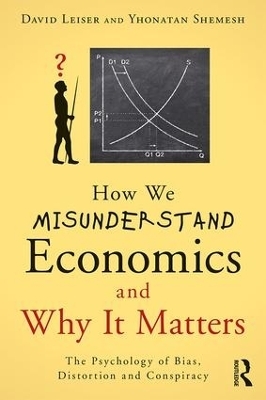
How We Misunderstand Economics and Why it Matters
Routledge (Verlag)
978-1-138-93893-9 (ISBN)
This is the first book to explain why people misunderstand economics. From the cognitive shortcuts we use to make sense of complex information, to the metaphors we rely on and their effect on our thinking, this important book lays bare not only the psychological traits that distort our ability to understand such a vital topic, but also what this means for policy makers and civil society more widely.
Accessibly written, the book explores the mismatch between the complexities of economics and the constraints of human cognition that lie at the root of our misconceptions. The authors document and explain the gamut of cognitive strategies laypeople employ as they grapple with such complex topics as inflation, unemployment, economic crises, finance, and money in the modern economy. The book examines sources of misconceptions ranging from the intentionality fallacy, whereby economic phenomena are assumed to have been caused deliberately rather than to have come about by an interplay of many agents and causal factors, to the role of ideology in framing economic thinking.
Exposing the underlying biases and assumptions that undermine financial and economic literacy, and concluding with recommendations for how policies and ideas should be framed to enable a clearer understanding, this will be essential reading not only for students and researchers across psychology and economics, but also anyone interested in progressive public policy.
Visit the associated website for the book here: http://www.misunderstandeconomics.com/
David Leiser is Full Professor of Economic and Social Psychology at Ben-Gurion University of the Negev, Israel. He is Past President of the International Association for Research in Economic Psychology, and President of the Economic Psychology Division of the International Association of Applied Psychology. He studies lay conceptions, especially in the economic domain. Yhonatan Shemesh holds a BA and MA in cognitive science from Ben-Gurion University of the Negev. His research focuses on the ways the human evolutionary cognitive endowment affects how people think and act in the modern world.
1. Introduction: Folk-Economic Beliefs 2. Why is Economics So Hard? 3. Cognitive Hurdles 4. Unemployment and Inflation 5. The ‘Good Begets Good’ Heuristic: The Relations Between Macro-Economic Variables 6. What is the Economy Like? How Metaphors Shape our Understanding of Economics 7. Ideologies: Lay Understanding of Capitalism 8. Money and Wealth 9. Financial and Economic Literacy 10. Public Policy Consequences
| Erscheinungsdatum | 26.07.2018 |
|---|---|
| Zusatzinfo | 7 Tables, black and white |
| Verlagsort | London |
| Sprache | englisch |
| Maße | 156 x 234 mm |
| Gewicht | 312 g |
| Themenwelt | Geisteswissenschaften ► Psychologie ► Allgemeine Psychologie |
| Wirtschaft ► Volkswirtschaftslehre | |
| ISBN-10 | 1-138-93893-9 / 1138938939 |
| ISBN-13 | 978-1-138-93893-9 / 9781138938939 |
| Zustand | Neuware |
| Haben Sie eine Frage zum Produkt? |
aus dem Bereich


